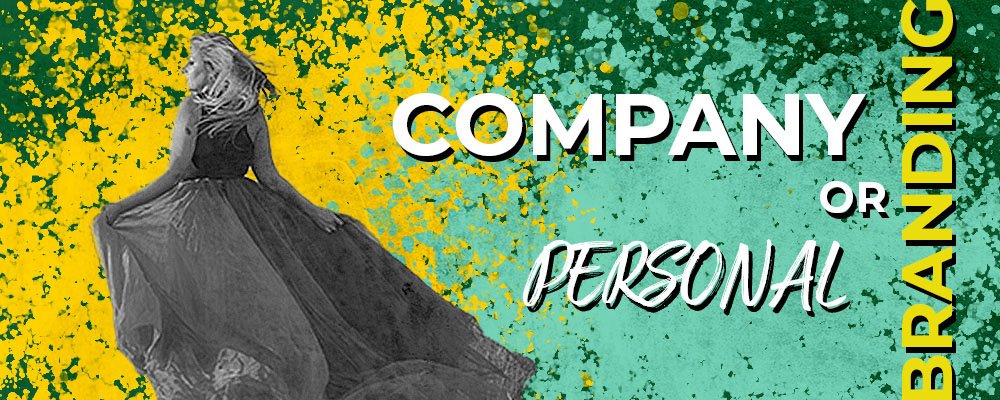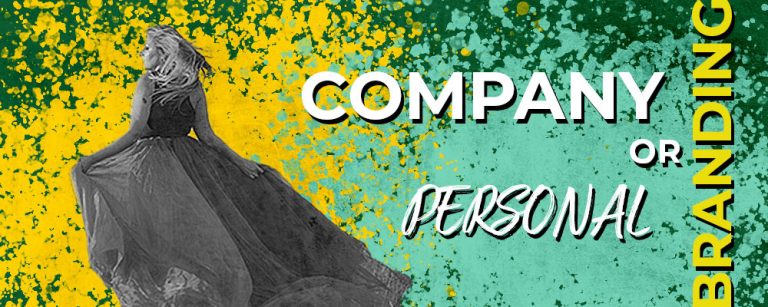Should I focus on Company or Personal Branding?
Both have their strengths and can be very effective. Let’s look into the differences and benefits to help you decide which approach is right for you.
Company Branding: The Big Picture
Company branding is all about creating a cohesive and professional image for your business.
This includes everything from your product or service, customer services, mission, vision, overall character of the company, the company culture, visual identity (logo, colours, graphic elements, typography, web design).
The messaging and visual style should be cohesive and might be more formal but that depends entirely on the brand personality.
For example, a very big company like Apple has a strong brand and is well-established. Their marketing reflects their core values like innovation, high quality and simplicity. Because of this, Apple doesn’t rely heavily on personal branding.
ESSENTIAL POINTS
- Consistency: Communicating what you’re promising to your clients and aligning this with the company’s core values.
- Professionalism: A well-managed company brand looks credible and trustworthy.
- Scalability: As your company grows, maintaining a consistent brand helps new and existing customers to recognise your company brand.
- Harder to Build Trust: People may find it harder to connect with a faceless brand. “Customer’s buy from people they know, like and trust.” – Zig Ziglar
Own sketch illustration (no AI)
Personal Branding: The Human Touch
Personal branding focuses on you as an individual.
These are your skills, experiences, personality, values, opinions. It’s about sharing your personal journey including the ups and downs. The messaging and visual style is showing up and sharing your voice authentically with personal experiences, stories and insights. This approach is more personal and can create deeper connections with your audience.
For example Tijen Onaran, entrepreneur of ACI Diversity Consulting, investor, speaker and author. Her personal branding stands out for me as inspiring promoting female empowerment and leadership in business.
Another personal brand example in the wellbeing space is EFT practitioner Juliet Whyte. I see her personal branding as consistent and authentic to what she is offering. On Instagram, she stays true to her visual identity, blending professional holistic wellness advice with personal posts that showcase her genuine personality. This mix creates a relatable and engaging presence and builds loyalty having had the pleasure of experiencing her services which enabled genuine personal transformations.
KEY TAKEAWAYS
- Authenticity: Personal branding feels more genuine and relatable.
- Trust and Connection: People connect with real people, making it easier to build trust and loyalty.
- Flexibility: You can pivot your personal brand more easily than a company brand.
- Consistency: Maintaining a consistent personal brand can be challenging, especially as your interests and experiences evolve and as we are constantly bombarded with new social trends to try out.
Own sketch illustration (no AI)
Choosing Your Path
So, which is better: company branding or personal branding?
The answer depends on your goals and the nature of your business.
If you’re a small business owner or solopreneur:
- I believe Personal Branding might be more effective. Your story and personal touch can set you apart from larger competitors and help you build a loyal following. It depends on your industry though e.g. a family funeral services benefits more from company branding to showcase their services due to the sensitive nature.
- Use your personal brand to network and connect.
If you’re running a larger company:
- Company Branding is important for a consistent and professional image. Growth comes from credibility and trust.
- If your company brand is inconsistent but your employees are passionate about it, focus on refining the brand. Is your culture inclusive through tangible actions? When employees feel valued and aligned with the company’s vision, they are more likely to drive the brand forward.
- If your company brand is strong and well-communicated but employees aren’t fully engaged, consider adding personal branding into your social media strategy. Employees can become influential brand ambassadors. This gives the audience a feel for the company’s culture.
It’s about Balance
In many cases, the best approach is a blend of both.
You can have a strong company brand that communicates your business values and a personal brand that showcases the people behind the company – whatever the company size.
Who Gives a Crap is a British company with a strong commitment to sustainability and social impact. They combine both company and personal branding well. With a consistent light-hearted approach they engage customers and make a positive impact. Check out their Instagram, it supplements their disruptive but playful character with word plays and toilet humour.
The key to any branding is to stay honest + real + consistent. Understand your audience, know your values, and communicate them clearly.
By doing so, you’ll build a brand that not only looks good but also resonates deeply with your audience.
Please note any company names mentioned on here are just from my personal observation, I’m not being paid for this.
Get in touch for a free consultation call to see if I can help you with your branding.




